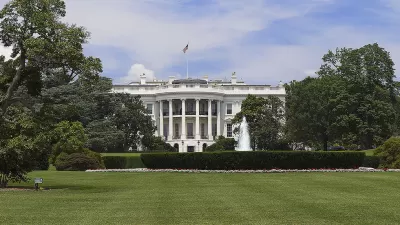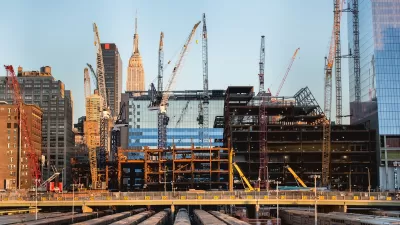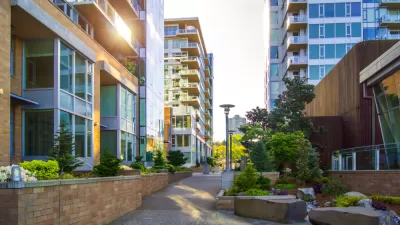The proposed budget seeks to expand the housing voucher program, incentivize housing production, and promote zoning reform, but will likely face strong opposition from congressional Republicans.

The proposed budget released by the White House on Thursday includes over $175 billion in investments directed at increasing the nation’s housing supply and alleviating the affordability crisis.
As Michael Brady explains in Smart Cities Dive, “The budget proposal includes $59 billion in mandatory funding and tax incentives to increase the affordable housing supply and $10 billion in mandatory funding to create incentives for state and local governments to eliminate barriers to affordable housing such as restrictive zoning.”
The proposal includes a neighborhood homes tax credit, which “would cover the gap between the construction costs and the sale price for rehabilitated or newly constructed single-family homes in low-income communities,” as well as an expansion of the low-income housing tax credit, rental assistance, among other incentives and subsidies. The budget also proposes an expansion of the Housing Choice Voucher program, voucher guarantees for vulnerable groups, and funding for eviction prevention efforts.
Brady notes that “Congress is unlikely to pass the president’s budget as written, with the White House engaged in a pitched battle with congressional Republicans over spending priorities and the debt ceiling.” Meanwhile, a budget outline being considered by congressional Republicans would cut 43 percent from housing programs and paves the way for eliminating the Housing Choice Voucher program.
FULL STORY: More than $175B in housing investments in Biden budget proposal

Alabama: Trump Terminates Settlements for Black Communities Harmed By Raw Sewage
Trump deemed the landmark civil rights agreement “illegal DEI and environmental justice policy.”

Planetizen Federal Action Tracker
A weekly monitor of how Trump’s orders and actions are impacting planners and planning in America.

The 120 Year Old Tiny Home Villages That Sheltered San Francisco’s Earthquake Refugees
More than a century ago, San Francisco mobilized to house thousands of residents displaced by the 1906 earthquake. Could their strategy offer a model for the present?

In Both Crashes and Crime, Public Transportation is Far Safer than Driving
Contrary to popular assumptions, public transportation has far lower crash and crime rates than automobile travel. For safer communities, improve and encourage transit travel.

Report: Zoning Reforms Should Complement Nashville’s Ambitious Transit Plan
Without reform, restrictive zoning codes will limit the impact of the city’s planned transit expansion and could exclude some of the residents who depend on transit the most.

Judge Orders Release of Frozen IRA, IIJA Funding
The decision is a victory for environmental groups who charged that freezing funds for critical infrastructure and disaster response programs caused “real and irreparable harm” to communities.
Urban Design for Planners 1: Software Tools
This six-course series explores essential urban design concepts using open source software and equips planners with the tools they need to participate fully in the urban design process.
Planning for Universal Design
Learn the tools for implementing Universal Design in planning regulations.
Clanton & Associates, Inc.
Jessamine County Fiscal Court
Institute for Housing and Urban Development Studies (IHS)
City of Grandview
Harvard GSD Executive Education
Toledo-Lucas County Plan Commissions
Salt Lake City
NYU Wagner Graduate School of Public Service





























